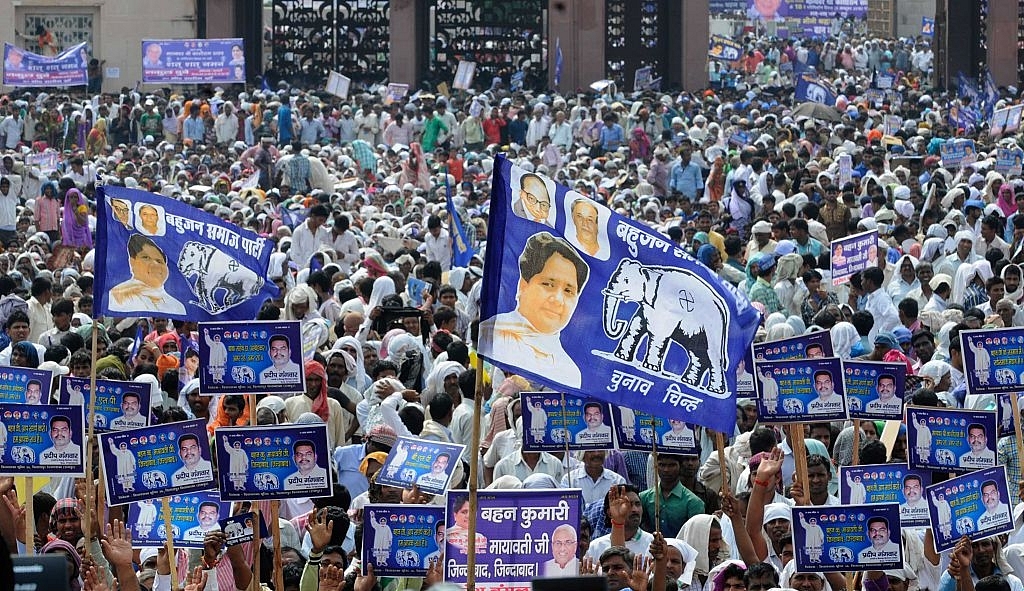Politics
Uttar Pradesh Local Body Elections: The Talk Of BSP Resurgence Nothing But Hot Air
- The overall seats won by the BSP do not give any hint of the party’s resurgence. Instead, the road ahead for the party does not look very rosy.

Bahujan Samaj Party supporters during a rally in Lucknow. (Deepak Gupta/Hindustan Times via Getty Images)
Contrary to reports that Bahujan Samaj Party (BSP) and Samajwadi Party (SP) had done well in the recently held local body elections in Uttar Pradesh, the vote share of the two parties has gone down in comparison to the assembly elections held in February-March 2017.
While SP's vote percentage came down from 21.8 per cent to 18 per cent, BSP's fell from 22.2 per cent to 18 per cent. In terms of per cent of votes polled, the local body polls brought about parity between the two political rivals.
Congress party was the surprise gainer with its vote percentage rising from 6.2 per cent to 10 per cent.
Interestingly, the independents performed better than the three opposition parties combined in the nagar panchayat and nagar palika elections. Their vote share jumped from 2.5 per cent in the assembly elections to 20.4 per cent in the local body polls.
Because of the surge in the vote share of independents, the ruling Bharatiya Janata Party’s (BJP's) vote percentage also saw a sizeable decline from 39.7 per cent in March 2017 to 30.8 per cent now.
These elections also saw All India Majlis-e-Ittehadul Muslimeen (AIMIM) make inroads in Muslim dominated western UP, which is not a good sign for either the SP or the BSP.
The BSP’s only good showing has been in the mayoral elections. It registered twin successes in Meerut and Aligarh, both BJP strongholds, if one goes by the assembly results. These are the two victories, which has made the party sit up and wonder if these gains would come useful in the 2019 elections as Dalit-Muslim combination is said to have tilted the balance in Mayawati’s favour.
The party lost in Saharanpur by 1,800 votes which suggested that nothing has changed on the ground. In the assembly elections also the BSP candidates were runners-up in Behat, Saharanpur, Deoband and Rampur Maniharan. Saharanpur Nagar seat was won by SP and BJP was the runner up, while in Gangoh, Congress was placed second.
But the same Dalit-Muslim combination did not work well in Saharanpur, where Mayawati went after caste clashes between Dalits and Rajputs.
In other semi-urban bodies, the BSP was behind SP by a sizeable margin. Therefore, the brouhaha over its victories in Meerut and Aligarh should be limited to just those two seats.
The SP and BSP complained that electronic voting machines were tampered with after the BJP won 14 of the 16 posts of mayor and claimed that results were more reliable where ballot papers were used. They apparently failed to notice that the ruling party had won 70 seats of nagar palika chairmen. In comparison, SP won 43 seats, BSP 29 and Congress nine. Independents won 43 seats.
The BJP also led the pack by winning 596 seats of municipal corporators, followed by SP 202, BSP 147 and Congress 100. Independents pushed SP to the third spot by winning 224 seats.
Even in the elections to nagar panchayat chairmen, the BSP could manage to win only 45 seats, compared to SP’s 83 and BJP’s tally of 100. The independents gave the established parties a drubbing by grabbing 182 seats.
The overall seats won by the BSP do not give any hint of the party’s resurgence. Instead, it is the SP which has retained its number two position overall despite suffering a whitewash in the mayoral polls. For the BSP the road ahead is as pot-holed as those in parts of Uttar Pradesh.
Introducing ElectionsHQ + 50 Ground Reports Project
The 2024 elections might seem easy to guess, but there are some important questions that shouldn't be missed.
Do freebies still sway voters? Do people prioritise infrastructure when voting? How will Punjab vote?
The answers to these questions provide great insights into where we, as a country, are headed in the years to come.
Swarajya is starting a project with an aim to do 50 solid ground stories and a smart commentary service on WhatsApp, a one-of-a-kind. We'd love your support during this election season.
Click below to contribute.
Latest